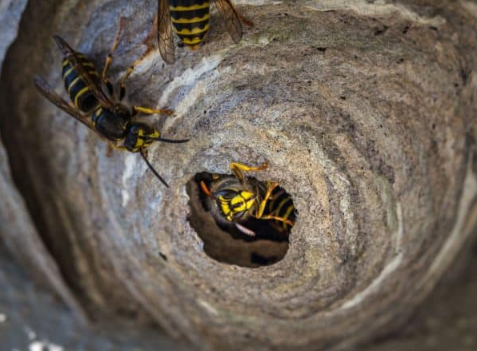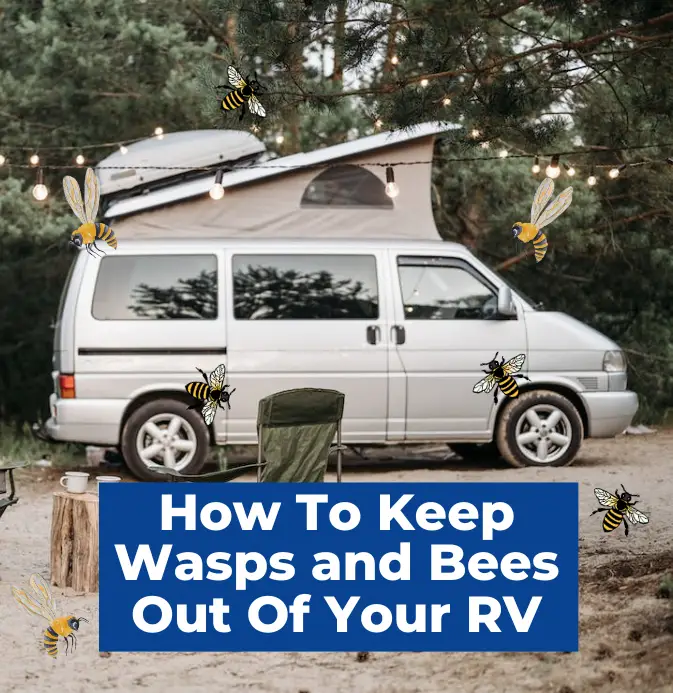When it comes to RV living, keeping pests out of your home on wheels is a top priority. Wasps and bees can be particularly troublesome, especially during the summer months when they are most active. These insects can not only be a nuisance but can also pose a safety hazard, particularly for those who are allergic to their stings.We’ll look at some effective ways of how to keep wasps and bees out of your RV in this guide.
One of the most important steps to take in preventing wasps and bees from entering your RV is to seal up any openings. This includes vents, windows, and doors. Make sure that all screens are intact and free of holes. Covering vents with flying insect screens is another effective way to keep these pests out.
Inspecting your gas appliances is also crucial, as bees are attracted to the smell of propane. Regularly checking all gas appliances, including the furnace, water heater, and fridge, can help prevent these insects from entering your RV.
Another effective way to keep wasps and bees out of your RV is to avoid camping in areas with a lot of bee activity or hives. When searching for a campsite, look for signs of bee activity such as a lot of flowers or honeycombs nearby.
Honeybees typically nest in hollows in trees, while bumblebees nest in the ground or in decaying logs.
Being aware of the signs of bee activity can help you avoid camping in areas where these insects are prevalent. By taking these simple precautions, you can enjoy your RV adventures without the annoyance and danger of wasps and bees.
Read on for more tips on RV wasp and bee prevention.
How To Keep Wasps and Bees Out of Your RV

When it comes to camping, wasps and bees can become a real problem. Not only are they annoying, but they can also be dangerous if you or someone in your family is allergic to their stings.
Bees are also important members of the ecosystem, and it is important to keep them safe. Here are some tips on how to keep wasps and bees out of an RV or camper.
Cover Your RV Exterior Openings & Vents
Covering your RV’s exterior openings and vents is an effective way to keep wasps and bees out of your RV. You can use flying insect screens to cover the openings of your refrigerator, furnace, and water heater.
These screens allow for proper ventilation while keeping insects out.
Don’t Leave Sugary Food And Drinks Outside
Wasps and bees are attracted to sugary foods and drinks. It’s important not to leave any sugary food or drinks outside your RV. Make sure to clean up any spills or crumbs immediately.
Remove Any Visible Nests ASAP
If you see any visible nests around your RV, it is important to remove them as soon as possible. Wasps and bees can be aggressive when defending their nests, and it is best to avoid any confrontations.
Spray WD-40 Around Your RV Vents
Spraying WD-40 around your RV’s vents is an effective way to prevent wasps from nesting. WD-40 is also effective in killing and preventing wasps. Spray some WD-40 around all of your RV’s vents to help keep wasps from nesting.
Bees Love The Smell Of Propane – Inspect Your Appliances
Bees are attracted to the smell of propane. Therefore, it is important to inspect your appliances, such as your stove and refrigerator, for any leaks or damages. Make sure to fix any issues before they become a problem.
Check Your Cabinets
Bees and wasps can find their way into your RV through small openings. Therefore, it is important to check your cabinets for any openings or gaps. Seal any gaps or openings with caulk or foam.
Look Behind Your RV Refrigerator
Bees and wasps can also make their way into your RV through the back of your refrigerator. Make sure to check behind your RV refrigerator and seal any gaps or openings.
Use Repellents & Traps To Prevent Future Problems
Using repellents and traps is an effective way to prevent future problems with bees and wasps. There are many different types of repellents and traps available on the market. Make sure to choose one that is safe for you and your family.
Frequently Asked Questions
To prevent wasps and bees from building nests in your RV, it is important to inspect and seal any gaps or holes in your RV’s exterior. Additionally, try to keep your RV clean and free of food debris and garbage, as these can attract insects. Regularly inspecting your RV’s gas appliances is also important, as bees are attracted to the smell of propane.
Peppermint, lemongrass, and citronella essential oils can be effective in repelling wasps and bees. Planting bee-beloved flowers such as lavender, crocus, hyacinth, and snapdragons at the far edge of your yard can also help keep bees and wasps away from your RV.
To seal up any gaps or holes in your RV, use silicone caulk or expanding foam insulation. Be sure to inspect and seal any potential entry points, including around vents, doors, windows, and pipes.
Wasps and bees are attracted to sweet and sugary substances, as well as meat and protein. To avoid attracting these insects, keep your RV clean and free of food debris and garbage. Store food in airtight containers, and clean up spills and crumbs promptly.
To properly dispose of food waste, use sealed garbage bags and dispose of them in a designated trash receptacle. Avoid leaving food waste out in the open, as this can attract insects.
If you encounter a swarm of bees or wasps near your RV, it is important to stay calm and avoid swatting at them. Move away slowly and calmly, and seek shelter indoors or in your RV if possible. If you are stung, remove the stinger and apply ice to the affected area to reduce swelling. If you experience an allergic reaction or have difficulty breathing, seek medical attention immediately.
Check out our other helpful RV pest control guides while you’re here:

